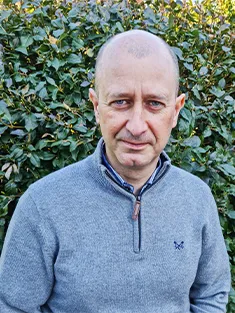Winner: 2021 Tilden Prize
Professor Jonathan Reid
University of Bristol
For pioneering studies of the chemical and physical properties of micron-scale aerosol particles, and their impact in atmospheric, health, analytical and formulation sciences.

Aerosols are so much more than the familiar aerosol can. Like any system of particles dispersed within a gas phase, aerosols are found widely in the atmosphere in clouds and in polluted urban centres. They are used in the delivery of drugs to the lungs to treat asthma, they play a crucial role in the transmission of disease when someone coughs or speaks, and they are used in a wide range of homecare and personal care products. Professor Reid’s work specifically looks at the processes that occur at the level of a single aerosol particle that govern their behaviour and impacts. During the COVID-19 pandemic, his team have been measuring how many aerosol particles people emit when they speak, sing, play a wind instrument or participate in exercise, how long the coronavirus survives while airborne, and how far it can be transmitted. His team are also exploring the evaporation and condensation of water on particles on inhalation to the lung, how they can be resuspended from surfaces, and how to make particles of controlled properties using aerosols.
Biography
Jonathan Reid is Professor of Physical Chemistry at the University of Bristol. After completing his PhD at the University of Oxford in 1997 (supervisor: C J S M Simpson), he moved to the University of Colorado (USA) as a postdoctoral research fellow (supervisor: S R Leone). He was appointed to a Lectureship at the University of Birmingham in 2000 before moving to the University of Bristol in March 2004. Professor Reid has extensive experience in developing novel single particle techniques to study microphysical aerosol processes. His current research is tackling challenges in atmospheric science, drug delivery to the lungs, formulation science and disease transmission, and is funded by the EPSRC, BBSRC, MRC and NERC. He has published over 200 manuscripts in a wide range of peer-reviewed journals (PNAS, Nature Comm, Central Science, Applied and Environmental Microbiology, Pharmaceutical Research) and has held both an EPSRC Advanced Research Fellowship and an EPSRC Leadership Fellow. He was co-editor of Fundamentals and Applications in Aerosol Spectroscopy (Taylor & Francis, 2010, edited with Professor Ruth Signorell, ETH-Zurich). Among his awards are the Royal Society of Chemistry Corday-Morgan Medal (2013), the Marlow Medal of the Faraday Division (2004) and the Harrison Memorial Medal (2001). He is a past President of the Aerosol Society of UK and Ireland, the current Editor-in-Chief of the AAAR journal Aerosol Science and Technology, and the director of the EPSRC Centre for Doctoral Training in Aerosol Science.
Teamwork is crucial to delivering good science.
Professor Jonathan Reid
Q&A with Professor Jonathan Reid
Who or what has inspired you?
I have had the honour of working with some excellent mentors during the course of my career. Dr Stephen Simpson, my PhD supervisor at the University of Oxford, inspired me to always enjoy the challenges and rigours of research. Professor Steve Leone, my postdoc advisor at the University of Colorado, was an exceptional mentor as I took on my first academic position, juggling the many pressures of being an early career researcher. And Professor Ian Smith, University of Birmingham, encouraged me to aspire to excellence in research and teaching.
What advice would you give to a young person considering a career in chemistry?
It may sound trite, but pursue what you enjoy. Ultimately you need to enjoy what you do and be prepared to take a step back and look at the big picture, particularly on the days when things are not going well and you have setbacks.
Can you tell us about a scientific development on the horizon that you are excited about?
Aerosols are a much under-studied colloidal system. We only need to look at the current pandemic to appreciate how little their role in disease transmission is understood. They are also a key component of the atmosphere, impacting on health through poor air quality and potentially providing a controversial route to counter climate change through geoengineering. But there are also many opportunities to use them in, for example, the delivery of drugs to the lungs and in fabricating particles of tailored functionality. There is considerable scope to use these highly dynamic systems more widely and to control their chemistry.
What has been a highlight for you (either personally or in your career)?
Succeeding in a bid to the Engineering and Physical Sciences Research Council to establish a Centre for Doctoral Training (CDT) in Aerosol Science in 2019. This has been an exciting opportunity to draw together researchers in aerosol science from seven UK universities and over 50 industrial and public sector partners to train the next generation of researchers. It has been a privilege to lead in the development of the Centre and to see how first two cohorts of students begin their training and research careers.
What does good research culture look like/mean to you?
Collaborative, respectful, multidisciplinary and diverse, where the members of a team encourage each other to reflect on their professional practice, to take collective responsibility for meeting a challenge, and share the workload.
Why do you think teamwork is important in science?
Teamwork is crucial to delivering good science. Teams need to be diverse and inclusive, bringing together researchers from a broad range of cultural and scientific backgrounds, supporting each other to excel and develop. In the aerosol science CDT, we use team based learning for many of our training activities. Our teams are hugely multidisciplinary, often with members from the life and health sciences and engineering, as well as the physical sciences. It is exciting when you see the teams tackling a problem that requires the diversity of skills and backgrounds to succeed, and when they discover that working collaboratively allows them to function as much more than just a sum of the parts.